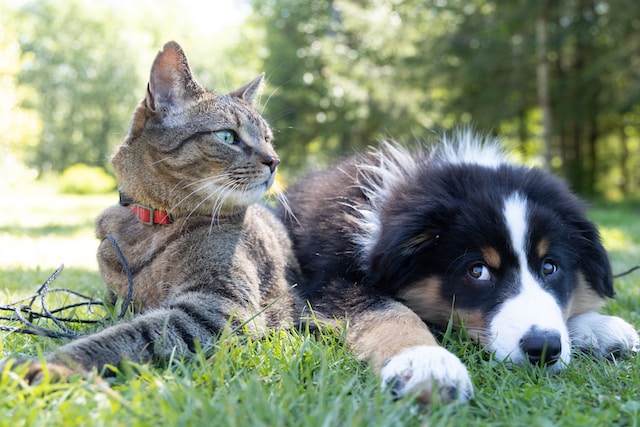Introduction:
The age-old debate of whether cats or dogs reign supreme in the intelligence department has sparked discussions among pet enthusiasts for years. While both cats and dogs exhibit unique cognitive abilities, problem-solving skills, and emotional intelligence, the question of which species is smarter remains a fascinating and often subjective topic. In this exploration, we’ll dive into the characteristics that contribute to feline and canine intelligence, acknowledging the distinct qualities that make both cats and dogs extraordinary companions.

Cognitive Abilities in Cats:
Cats are renowned for their independent and mysterious nature, which often leads to the perception that they are aloof or less trainable. However, feline intelligence manifests in various ways:
- Problem Solving: Cats are natural problem solvers. Whether it’s figuring out how to open a door, access a treat, or navigate a complex environment, felines demonstrate impressive problem-solving skills.
- Memory: Cats possess a strong memory, particularly when it comes to learning from experiences. They remember routines, locations of resources, and even people, showcasing their ability to recall information.
- Adaptability: Cats are highly adaptable creatures. They can adjust to new environments, learn to use litter boxes quickly, and even modify their hunting strategies based on the behavior of their prey.
Cognitive Abilities in Dogs:
Dogs, on the other hand, have a long history of domestication and working alongside humans. Their intelligence is often evident in:

- Social Intelligence: Dogs are highly social animals, and their ability to understand human emotions, follow cues, and form deep bonds with their owners contributes to their reputation as loyal and emotionally intelligent companions.
- Trainability: Dogs are famously trainable, thanks to their eagerness to please and respond to positive reinforcement. This has made them valuable working partners in various roles, from service and therapy dogs to search and rescue teams.
- Problem Solving: While dogs may not approach problem-solving with the same independence as cats, many breeds display remarkable problem-solving skills. Working dogs, in particular, excel in tasks that require critical thinking and decision-making.

Comparing Intelligence:
When comparing the intelligence of cats and dogs, it’s crucial to recognize that their cognitive abilities are adapted to their unique lifestyles and evolutionary histories. Cats, as solitary hunters, have developed skills that enable them to navigate their surroundings independently. Dogs, as pack animals with a long history of collaboration with humans, excel in social intelligence and teamwork.
The Verdict:
Determining whether cats are smarter than dogs or vice versa is subjective and dependent on the criteria used to measure intelligence. While cats showcase independence, problem-solving, and adaptability, dogs exhibit social intelligence, trainability, and problem-solving within the context of their domestic roles.
In reality, both cats and dogs possess extraordinary qualities that contribute to their intelligence in different ways. Ultimately, the measure of a pet’s intelligence is often intertwined with the unique bond and understanding shared between the animal and its human companion. Whether you’re a cat enthusiast or a dog lover, the richness of the relationship between humans and their furry friends transcends the debate on intelligence, celebrating the diverse and wonderful qualities that make each species remarkable in its own right.
